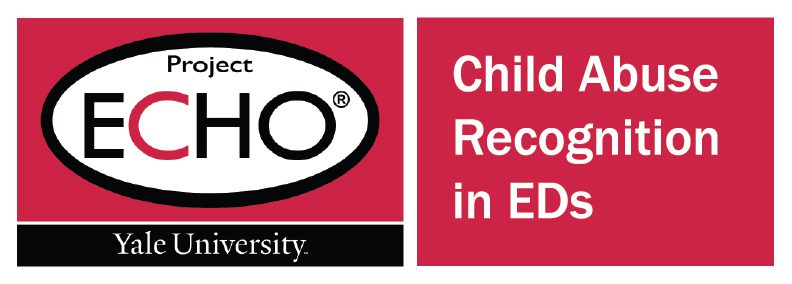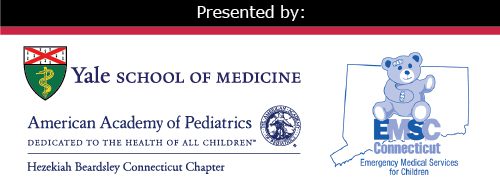Child Abuse TeleECHO® Clinic

Recommended Handouts/Articles
Case Presentation:
Have a patient case you wish to have reviewed by the team? Please download, complete and submit the above case presentation form to gunjan.kamdar@yale.edu
Child Abuse TeleECHO® Clinic Recorded Sessions:
Adolescent Health & Confidentiality: Teen Legal Rights & Healthcare Access in the Emergency Department - Jay E. Sicklick, JD
Recorded on August 6, 2018
Presentation Slides
Online Evaluation
Echo Presentation Recording
Partnering to Serve Children and Families Following Potentially Traumatic Events - Steven Marans, PhD, MSW
Recorded on July 26, 2018
Presentation Slides
Online Evaluation
Echo Presentation Recording
Ethics of Child Maltreatment - Live ECHO Panel Discussion
Recorded on June 28, 2018
Whats the Matter Here? Child Sex Trafficking and the Role of the Medical Provider - Kirsten Bechtel, MD
What You Need to Know About Opioids - Carl Baum, MD, FAAP, FACMT
Recorded on April 30, 2018
Presentation Slides
Online Evaluation
Echo Presentation Recording
Responding to Neglect in the ED - Nina Livingston, MD
Recorded on March 29, 2018
Presentation Slides
Online Evaluation
Echo Presentation Recording
Recommended Handouts/Articles:
When to Worry About Abuse in Young Children with Fractures - John M. Leventhal, MD
Recorded on Feb. 22, 2018
Presentation Slides
Online Evaluation
Echo Presentation Recording
Recommended Handouts/Articles:
Community Hospitals Making Reports To The DCF Child Abuse Careline - Gloria Jeter, LMSW
Recorded on Jan. 25, 2018
Presentation Slides
Online Evaluation
Echo Presentation Recording
Recommended Handouts/Articles:
Sexual Assualt Evaluation - Lisa Pavlovic, MD
Recorded on Dec. 18, 2017
Presentation Slides
Online Evaluation
Echo Presentation Recording
Recommended Handouts/Articles:
Abusive Head Trauma - Kirsten Bechtel, MD
Recorded on Nov. 30, 2017
Presentation Slides
Online Evaluation
Echo Presentation Recording
Recommended Handouts/Articles:
- Abusive Head Trauma in Children Presenting with an Apparent Life-Threatening Event
- Flawed Theories to Explain Child Physical Abuse. What Are the Medical-Legal Consequences?
- Validation of the Pittsburgh Infant Brain Injury Score for Abusive Head Trauma
- Clinical and Radiographic Characteristics Associated With Abusive and Nonabusive Head Trauma: A Systematic Review
- Effective Radiation Dose in a Skeletal Survey Performed for Suspected Child Abuse
- Subconjunctival Hemorrhages in Infants and Children: A Sign of Nonaccidental Trauma
Sentinel Injuries: How to Identify Subtle Signs of Child Abuse - Andrea Asnes, MD
Diagnosing Child Maltreatment: The Challenges Faced by Clinicians - John M. Leventhal, MD
Recorded on Sep. 28, 2017
Presentation Slides
Managing Child Abuse: General Principles Handout
Evaluation
Echo Presentation Recording

Project ECHO® links expert specialist teams at an academic hub with clinicians in local communities. Our aim is to provide child abuse and neglect education that is relevant to ED providers (MDs, APPS and RNs) in the community setting and provide a venue to both discuss cases that are challenging for providers as well as create relationships between our child abuse specialists and general ED providers in CT such that informal consultations can occur in the future.
The ECHO sessions includes didactic presentations by interdisciplinary group of specialists on specific topics of interest and in-depth case-based presentations by community clinicians for feedback and recommendations. Clinicians are given access to evidence-based educational resources, learn from expert consultation, and from one another in a comprehensive knowledge network and community of practice. This environment of group learning, using best practice protocols reduces variation in care and may improve the care we provide to an extremely vulnerable group of children!
![]()
